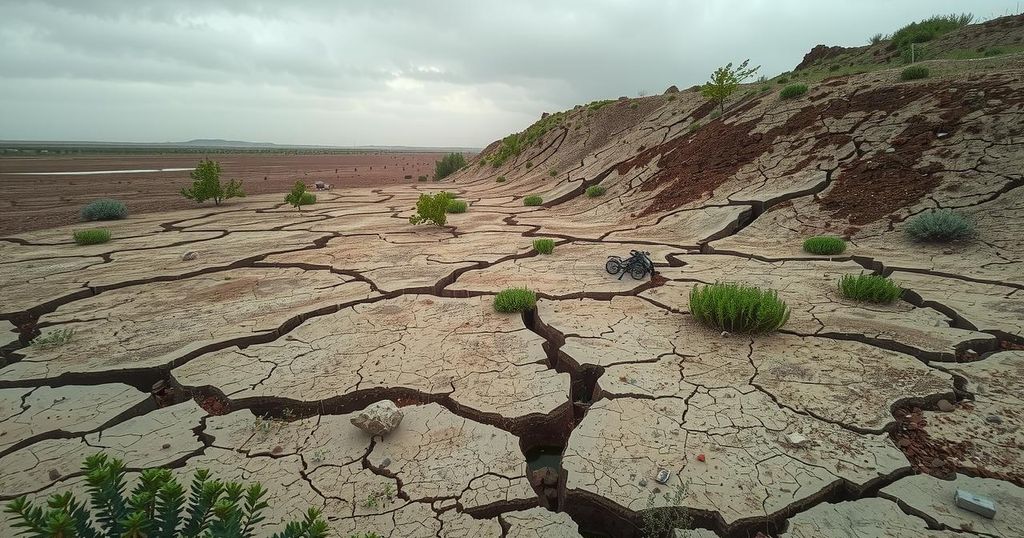“We Live Here” by Zhanana Kurmasheva explores the legacy of a Soviet nuclear test site in Kazakhstan, focusing on three generations confronting their haunting past. Premiering at CPH:DOX, the documentary discusses radioactive contamination’s impact on local communities and advocates for awareness of ecological issues. The film highlights both personal and collective struggles and emphasizes the deep connections individuals have to their land.
The documentary “We Live Here” by director Zhanana Kurmasheva explores the enduring legacy of a former Soviet nuclear test site in Kazakhstan. The film presents a poignant narrative of three generations grappling with the repercussions of this troubled history as they strive for hope in a precarious world. Premiering at the CPH:DOX festival, this film underscores the haunted state of the Semipalatinsk site, a location marked by 456 nuclear tests from 1949 to 1991, leaving a legacy of radioactive contamination.
According to the film’s synopsis, the vast Kazakh steppes serve as both a literal and metaphorical representation of broader existential threats. As described by CPH:DOX, Kurmasheva’s work is characterized by its chilling visuals, which accumulate to convey deep historical and existential themes. The documentary holds significant importance as it is the first film from Kazakhstan to participate in the festival’s international competition.
In an interview, Kurmasheva mentioned the disillusionment surrounding discussions of the nuclear site, noting, “There have been many films and TV series about this topic in our country because it’s part of the wounds of our nation.” Despite local fatigue regarding the subject, she expressed a personal connection to the land, urging a collective realization about responsibility for their community and environment.
Upon visiting the site, Kurmasheva was struck by its desolation, stating, “I’m Kazakh, and I know what the steppe is. But this steppe was totally different.” She reflected on the indifference towards the struggles of her people, questioning how they could reconcile their past with the present. The documentary further touches upon the crucial issue of humanity’s role in potential self-destruction while asserting that while mankind may falter, the Earth endures.
Banu Ramazanova, the film’s producer, emphasized the impact of the film’s acceptance into the Copenhagen festival as a vital breakthrough for Central Asia’s documentary scene. She expressed optimism about using this opportunity to enhance the perception and seriousness of the documentary genre in the region. Ramazanova expressed gratitude for the support from their home countries, as this visibility could help shift perspectives on Central Asia’s narratives.
Sales agent Syndicado is working to market the film globally, aiming to gain validation through international critiques. Ramazanova noted, “In Central Asia, to make an impact, you have to first make an impact abroad.” The producers already have ideas for their next documentary, focusing on ecological themes tied to mass consumerism and the path of clothing from production to disposal, highlighting consumer awareness.
The film’s original title, “Atameken,” translates to “My Sacred Land,” which reflects deep personal and cultural connections to the land affected by radiation. Kurmasheva articulated the significance of this attachment, stating, “I was born here. It’s very special for me,” emphasizing the geographical and emotional ties individuals have to their ancestral land. The film addresses the cyclical nature of history and the need for dialogue devoid of violence, reminding audiences of the singular Earth we inhabit.
In summary, “We Live Here” serves as an exploration of the legacies left by the Soviet nuclear tests in Kazakhstan. The documentary addresses personal and collective struggles against a backdrop of existential threats, questioning societal indifference and emphasizing the importance of ecological consciousness. As it debuts at CPH:DOX, the significance of the film transcends its local context, aiming to capture international attention and foster dialogue about nuclear legacy and environmental issues. Kurmasheva and Ramazanova’s commitment to sharing this poignant narrative illustrates the profound connection between identity, land, and the ongoing challenges humanity faces.
Original Source: www.hollywoodreporter.com




